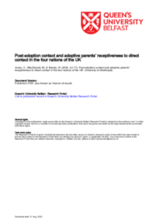

Displaying 461 - 470 of 1646
"Survivors of prolonged abuse while in the care of Lambeth Council have called for the failure to report abuse in children's homes to be made a crime," says this article from BBC News.
This paper examines experts' perceptions of the aims and outcomes of public inquiries, before moving on to consider whether there are more effective and efficient ways of investigating national scandals.
This paper examines experts' perceptions of the aims and outcomes of public inquiries, before moving on to consider whether there are more effective and efficient ways of investigating national scandals.
The aim of this study was to explore the experiences of unaccompanied refugee minor (URM) girls’ adaptation to life in Norway focusing on their strengths, and to examine the social and structural factors that influence settlement.
In this webinar, hosted by Better Care Network and SOS Children's Villages International, panelists - including careleavers who served as co-trainers in the Leaving Care project - discussed the training, building a supportive network for care leavers, and the support needed to ensure that the rights of young people in alternative care are respected and that they are prepared for an independent life.
This article reports on a study of children's experiences of being physically restrained by staff in a range of custodial settings, including Local Authority Secure Children's Homes, in the UK.
This article from the Guardian explores the impacts of the COVID-19 crisis on students in the UK who have been in care.
This briefing paper reports key findings from a recent study of direct contact between adoptive families and birth relatives within the four nations of the UK.
"Is the local authority care system in England failing children who run away and what happens to those who go missing?" asks this article. "The BBC has uncovered evidence of young people disappearing off the radar for weeks, months and, in some cases, years."
The goals of this article were to (a) examine the changes in educational achievements of children in care from preschool through the end of primary school; (b) identify subgroups exhibiting distinct educational trajectories; and (c) explore key predictive individual, care, and school characteristics.

